Unit 1 My family词汇预习课件(共19张PPT)
文档属性
| 名称 | Unit 1 My family词汇预习课件(共19张PPT) |

|
|
| 格式 | pptx | ||
| 文件大小 | 8.4MB | ||
| 资源类型 | 教案 | ||
| 版本资源 | 北师大版 | ||
| 科目 | 英语 | ||
| 更新时间 | 2021-09-24 00:00:00 | ||
图片预览

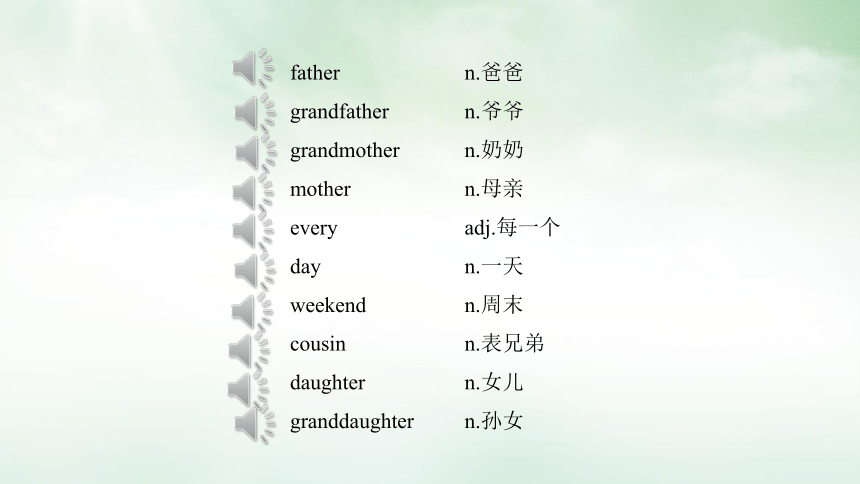
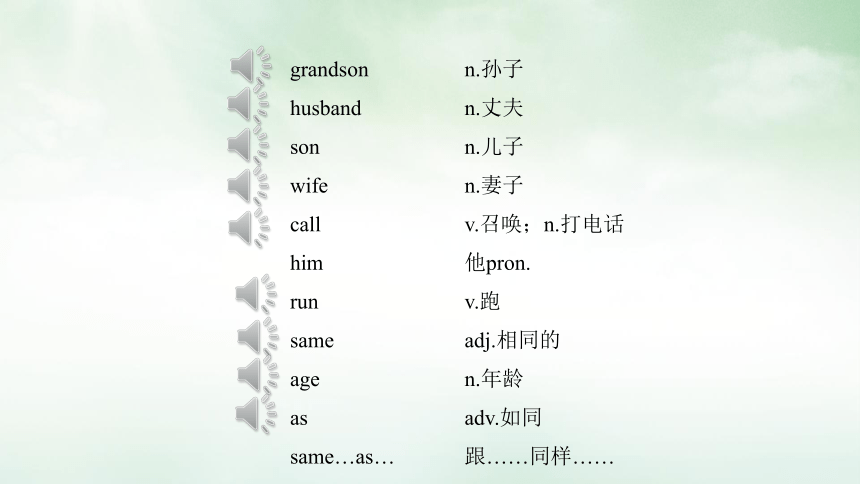
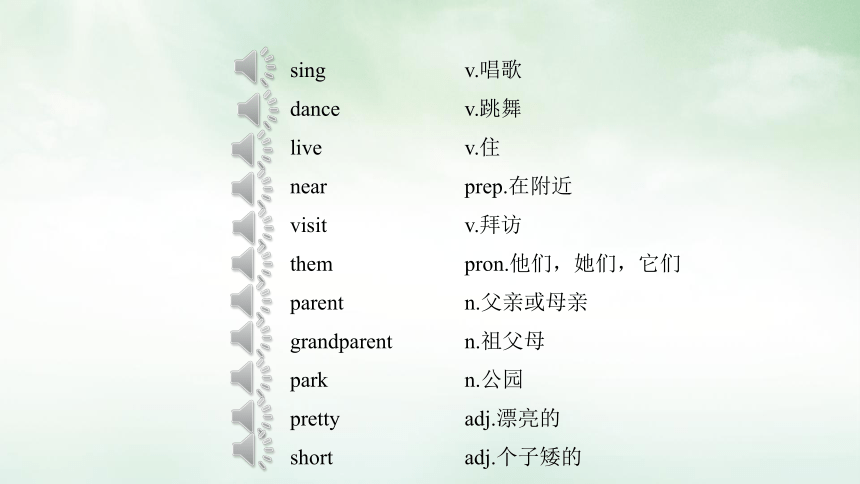
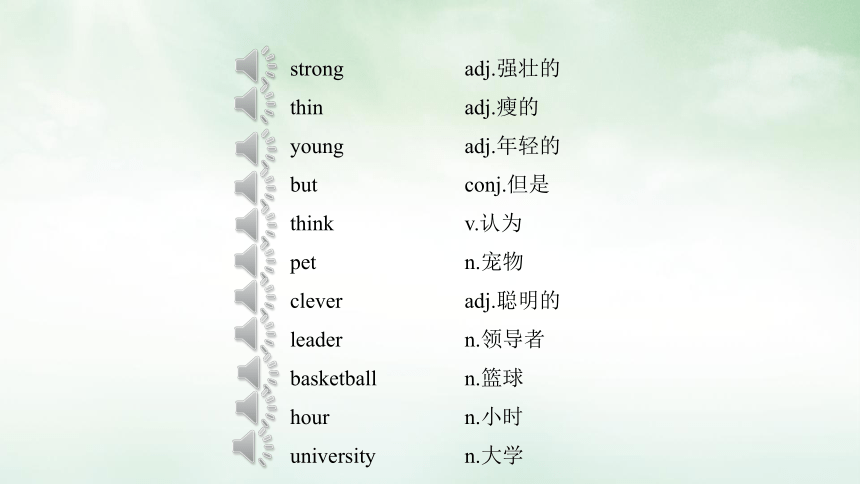
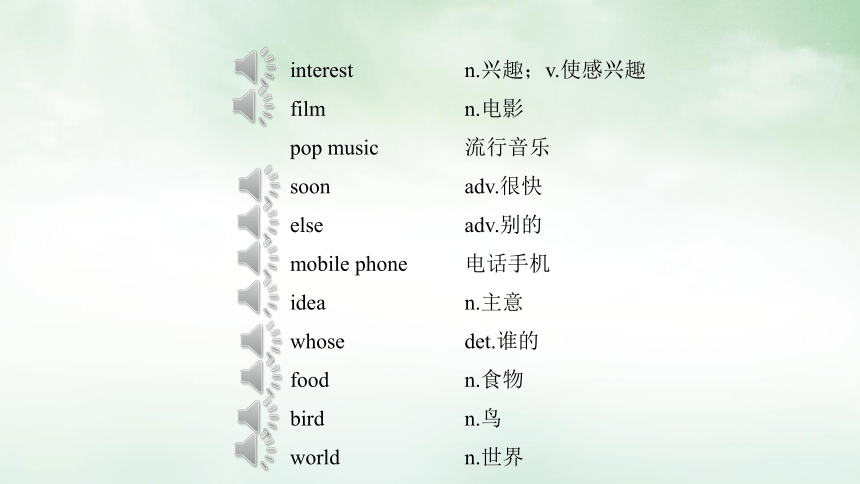

文档简介
(共19张PPT)
Unit
1
My
Family
词汇预习课件
father
n.爸爸
grandfather
n.爷爷
grandmother
n.奶奶
mother
n.母亲
every
adj.每一个
day
n.一天
weekend
n.周末
cousin
n.表兄弟
daughter
n.女儿
granddaughter
n.孙女
grandson
n.孙子
husband
n.丈夫
son
n.儿子
wife
n.妻子
call
v.召唤;n.打电话
him
他pron.
run
v.跑
same
adj.相同的
age
n.年龄
as
adv.如同
same…as…
跟……同样……
sing
v.唱歌
dance
v.跳舞
live
v.住
near
prep.在附近
visit
v.拜访
them
pron.他们,她们,它们
parent
n.父亲或母亲
grandparent
n.祖父母
park
n.公园
pretty
adj.漂亮的
short
adj.个子矮的
strong
adj.强壮的
thin
adj.瘦的
young
adj.年轻的
but
conj.但是
think
v.认为
pet
n.宠物
clever
adj.聪明的
leader
n.领导者
basketball
n.篮球
hour
n.小时
university
n.大学
interest
n.兴趣;v.使感兴趣
film
n.电影
pop
music
流行音乐
soon
adv.很快
else
adv.别的
mobile
phone
电话手机
idea
n.主意
whose
det.谁的
food
n.食物
bird
n.鸟
world
n.世界
词汇在语境中的理解
1.
every?
/?evri/
used
when
referring
to
all
the
members
of
a
group
of
three
or
more
(3个或3个以上的人或事物组成的群体中的)每一个,每个;全部,整体
例句:We’re
open
every
day
except
Sunday.
除了星期天我们每天都开门营业。
I’ve
been
out
every
night
this
week.
这个星期每天晚上我都外出。
used
to
show
that
something
is
repeated
regularly
(表示有规律地重复发生)每,每隔,每…之中
例句:The
conference
takes
place
every
other/second
year.
会议每隔一年/两年召开一次。
Computers
can
perform
millions
of
calculations
every
second.
计算机每秒钟能进行数百万次的运算。
2.
call?
verb
/k??l/
to
give
someone
or
something
a
name,
or
to
know
or
address
someone
by
a
particular
name给…取名,给…命名;称呼
例句:They’ve
called
the
twins
Edward
and
Thomas.
他们给双胞胎取名为凯瑟琳和托马斯。
What’s
her
new
novel
called?她的新小说叫什么名字?
to
use
a
phone
to
talk
to
someone打电话
例句:He
called
(you)
last
night
when
you
were
out.
昨晚你不在时,他(给你)打过电话。
Do
you
think
we
should
call
the
police?
你觉得我们应该报警吗?
to
ask
someone
to
come
to
you叫来;召,召唤
例句:She
called
me
over
to
where
she
was
sitting.
她把我叫到了她坐着的地方。
At
school
she
was
always
being
called
into
the
headteacher’s
office.
在学校时,她总是被叫到校长办公室去。
3.
same?
adjective
/se?m/
exactly
like
another
or
each
other相同的,同样的
例句:My
twin
sister
and
I
have
the
same
nose.
我孪生姐姐的鼻子和我的长得一样。
She
was
wearing
exactly
the
same
dress
as
I
was.
她穿的裙子和我的一模一样。
not
another
different
place,
time,
situation,
person,
or
thing相同的,同一的
例句:My
brother
and
I
sleep
in
the
same
room.
我弟弟和我睡在同一个房间。
They
eat
at
the
same
restaurant
every
week.
他们每个星期都在同一家餐馆吃饭。
4.
near?
adverb,
preposition
/n??r/
not
far
away
in
distance(离…)不远,靠近(地)
例句:Is
there
a
restaurant
near
here?
?这附近有火车站吗?
I’d
like
to
sit
near
a
window,
please.
?请给我一个靠窗的座位。
almost
in
a
particular
state,
or
condition(情况)接近地,濒临
例句:We
can
decide
which
route
to
take
nearer
the
time.
到时候我们再决定走哪条路线。
The
runners
looked
near
exhaustion.
赛跑的人看起来快要筋疲力尽了。
5.
visit?
verb
/?v?z?t/
to
go
to
a
place
in
order
to
look
at
it,
or
to
a
person
in
order
to
spend
time
with
them
参观;游览;拜访;作客
例句:Will
you
visit
me
when
I’m
in
hospital?
我住院你会来看我吗?
When
did
you
last
visit
the
dentist/doctor?
你上一次去看牙医/医生是什么时候?
6.
interest?
noun
/??ntr?st/
the
feeling
of
wanting
to
give
your
attention
to
something
or
of
wanting
to
be
involved
with
and
to
discover
more
about
something
兴趣,关注
例句:I’ve
always
had
an
interest
in
astronomy.
我一直对天文学感兴趣。
Unfortunately,
I
lost
interest
half
way
through
the
film.
遗憾的是,这部电影我才看了一半就失去了兴趣。
something
that
brings
advantages
to
or
affects
someone
or
something
利益,好处
例句:It’s
in
his
interests
to
keep
careful
records.
仔细做好记录对他有好处。
In
the
interests
of
safety,
please
do
not
smoke.
为了安全起见,请不要吸烟。
7.
soon
adverb
/su?n/
in
or
within
a
short
time;
before
long;
quickly
不久,很快
例句:She’ll
soon
be
here./She’ll
be
here
soon.
?她很快就到。
I
couldn’t
get
out
of
that
place
soon
enough.
我恨不得马上离开那个地方。
8.
idea?
noun
/a??d??/
a
suggestion
or
plan
for
doing
something意见,想法,主意;计划
例句:I’ve
had
an
idea
-
why
don’t
we
go
to
the
coast?
我有个主意——我们为什么不去海滨呢?
"Let’s
go
swimming."
"That’s
a
good
idea!"
“我们去游泳吧。”“好主意!”
an
understanding,
thought,
or
picture
in
your
mind了解,明白;概念,构想
例句:Do
you
have
any
idea
of
what
he
looks
like?
你知道他长什么样吗?
I
don’t
like
the
idea
of
living
so
far
away
from
my
family.
我不喜欢生活在离家这么远的地方。
9.
else?
adverb
/els/
used
after
words
beginning
with
any-,
every-,
no-,
and
some-,
or
after
how,
what,
where,
who,
why,
but
not
which,
to
mean
‘other’,
‘another’,
‘different’,
‘extra’
(用于以
any-,every-,no-
和
some-
开头的词后面,或用于
how,what,where,who,why
之后,但不用于
which
之后)其他,另外,别的
例句:Everybody
else
has
agreed
except
for
you.
除了你其他人都同意了。
It’s
not
my
bag.
It
must
be
someone
else’s.
这不是我的包,肯定是别人的。
10.
leader?
noun?
/?li?d?/
a
person
in
control
of
a
group,
country,
or
situation领导,领导人
例句:He’s
a
natural
leader.
?他天生就是个领导。
She
was
elected
as
leader
of
the
campaign
group.
?她被推举为竞选小组的领导。
someone
or
something
that
is
winning
during
a
race
or
other
situation
where
people
are
competing
领先者,占优势者
例句:He’s
fallen
two
laps
behind
the
leaders.
他已经落后领先者两圈了。
Microsoft
is
a
world
leader
in
software
design.
微软公司在软件设计方面处于世界领先地位。
Unit
1
My
Family
词汇预习课件
father
n.爸爸
grandfather
n.爷爷
grandmother
n.奶奶
mother
n.母亲
every
adj.每一个
day
n.一天
weekend
n.周末
cousin
n.表兄弟
daughter
n.女儿
granddaughter
n.孙女
grandson
n.孙子
husband
n.丈夫
son
n.儿子
wife
n.妻子
call
v.召唤;n.打电话
him
他pron.
run
v.跑
same
adj.相同的
age
n.年龄
as
adv.如同
same…as…
跟……同样……
sing
v.唱歌
dance
v.跳舞
live
v.住
near
prep.在附近
visit
v.拜访
them
pron.他们,她们,它们
parent
n.父亲或母亲
grandparent
n.祖父母
park
n.公园
pretty
adj.漂亮的
short
adj.个子矮的
strong
adj.强壮的
thin
adj.瘦的
young
adj.年轻的
but
conj.但是
think
v.认为
pet
n.宠物
clever
adj.聪明的
leader
n.领导者
basketball
n.篮球
hour
n.小时
university
n.大学
interest
n.兴趣;v.使感兴趣
film
n.电影
pop
music
流行音乐
soon
adv.很快
else
adv.别的
mobile
phone
电话手机
idea
n.主意
whose
det.谁的
food
n.食物
bird
n.鸟
world
n.世界
词汇在语境中的理解
1.
every?
/?evri/
used
when
referring
to
all
the
members
of
a
group
of
three
or
more
(3个或3个以上的人或事物组成的群体中的)每一个,每个;全部,整体
例句:We’re
open
every
day
except
Sunday.
除了星期天我们每天都开门营业。
I’ve
been
out
every
night
this
week.
这个星期每天晚上我都外出。
used
to
show
that
something
is
repeated
regularly
(表示有规律地重复发生)每,每隔,每…之中
例句:The
conference
takes
place
every
other/second
year.
会议每隔一年/两年召开一次。
Computers
can
perform
millions
of
calculations
every
second.
计算机每秒钟能进行数百万次的运算。
2.
call?
verb
/k??l/
to
give
someone
or
something
a
name,
or
to
know
or
address
someone
by
a
particular
name给…取名,给…命名;称呼
例句:They’ve
called
the
twins
Edward
and
Thomas.
他们给双胞胎取名为凯瑟琳和托马斯。
What’s
her
new
novel
called?她的新小说叫什么名字?
to
use
a
phone
to
talk
to
someone打电话
例句:He
called
(you)
last
night
when
you
were
out.
昨晚你不在时,他(给你)打过电话。
Do
you
think
we
should
call
the
police?
你觉得我们应该报警吗?
to
ask
someone
to
come
to
you叫来;召,召唤
例句:She
called
me
over
to
where
she
was
sitting.
她把我叫到了她坐着的地方。
At
school
she
was
always
being
called
into
the
headteacher’s
office.
在学校时,她总是被叫到校长办公室去。
3.
same?
adjective
/se?m/
exactly
like
another
or
each
other相同的,同样的
例句:My
twin
sister
and
I
have
the
same
nose.
我孪生姐姐的鼻子和我的长得一样。
She
was
wearing
exactly
the
same
dress
as
I
was.
她穿的裙子和我的一模一样。
not
another
different
place,
time,
situation,
person,
or
thing相同的,同一的
例句:My
brother
and
I
sleep
in
the
same
room.
我弟弟和我睡在同一个房间。
They
eat
at
the
same
restaurant
every
week.
他们每个星期都在同一家餐馆吃饭。
4.
near?
adverb,
preposition
/n??r/
not
far
away
in
distance(离…)不远,靠近(地)
例句:Is
there
a
restaurant
near
here?
?这附近有火车站吗?
I’d
like
to
sit
near
a
window,
please.
?请给我一个靠窗的座位。
almost
in
a
particular
state,
or
condition(情况)接近地,濒临
例句:We
can
decide
which
route
to
take
nearer
the
time.
到时候我们再决定走哪条路线。
The
runners
looked
near
exhaustion.
赛跑的人看起来快要筋疲力尽了。
5.
visit?
verb
/?v?z?t/
to
go
to
a
place
in
order
to
look
at
it,
or
to
a
person
in
order
to
spend
time
with
them
参观;游览;拜访;作客
例句:Will
you
visit
me
when
I’m
in
hospital?
我住院你会来看我吗?
When
did
you
last
visit
the
dentist/doctor?
你上一次去看牙医/医生是什么时候?
6.
interest?
noun
/??ntr?st/
the
feeling
of
wanting
to
give
your
attention
to
something
or
of
wanting
to
be
involved
with
and
to
discover
more
about
something
兴趣,关注
例句:I’ve
always
had
an
interest
in
astronomy.
我一直对天文学感兴趣。
Unfortunately,
I
lost
interest
half
way
through
the
film.
遗憾的是,这部电影我才看了一半就失去了兴趣。
something
that
brings
advantages
to
or
affects
someone
or
something
利益,好处
例句:It’s
in
his
interests
to
keep
careful
records.
仔细做好记录对他有好处。
In
the
interests
of
safety,
please
do
not
smoke.
为了安全起见,请不要吸烟。
7.
soon
adverb
/su?n/
in
or
within
a
short
time;
before
long;
quickly
不久,很快
例句:She’ll
soon
be
here./She’ll
be
here
soon.
?她很快就到。
I
couldn’t
get
out
of
that
place
soon
enough.
我恨不得马上离开那个地方。
8.
idea?
noun
/a??d??/
a
suggestion
or
plan
for
doing
something意见,想法,主意;计划
例句:I’ve
had
an
idea
-
why
don’t
we
go
to
the
coast?
我有个主意——我们为什么不去海滨呢?
"Let’s
go
swimming."
"That’s
a
good
idea!"
“我们去游泳吧。”“好主意!”
an
understanding,
thought,
or
picture
in
your
mind了解,明白;概念,构想
例句:Do
you
have
any
idea
of
what
he
looks
like?
你知道他长什么样吗?
I
don’t
like
the
idea
of
living
so
far
away
from
my
family.
我不喜欢生活在离家这么远的地方。
9.
else?
adverb
/els/
used
after
words
beginning
with
any-,
every-,
no-,
and
some-,
or
after
how,
what,
where,
who,
why,
but
not
which,
to
mean
‘other’,
‘another’,
‘different’,
‘extra’
(用于以
any-,every-,no-
和
some-
开头的词后面,或用于
how,what,where,who,why
之后,但不用于
which
之后)其他,另外,别的
例句:Everybody
else
has
agreed
except
for
you.
除了你其他人都同意了。
It’s
not
my
bag.
It
must
be
someone
else’s.
这不是我的包,肯定是别人的。
10.
leader?
noun?
/?li?d?/
a
person
in
control
of
a
group,
country,
or
situation领导,领导人
例句:He’s
a
natural
leader.
?他天生就是个领导。
She
was
elected
as
leader
of
the
campaign
group.
?她被推举为竞选小组的领导。
someone
or
something
that
is
winning
during
a
race
or
other
situation
where
people
are
competing
领先者,占优势者
例句:He’s
fallen
two
laps
behind
the
leaders.
他已经落后领先者两圈了。
Microsoft
is
a
world
leader
in
software
design.
微软公司在软件设计方面处于世界领先地位。
同课章节目录
- Get Ready
- Topic A You
- Topic B Your Friends
- Topic C Your Family
- Topic D Your classroom
- Topic E Your Room
- Unit 1 Family
- Lesson 1 Photos of Us
- Lesson 2 What Do They Look Like?
- Lesson 3 Happy Birthday!
- Communication Workshop
- Unit 2 School Life
- Lesson 4 School Things
- Lesson 5 Before Class
- Lesson 6 A School Day
- Communication Workshop
- Unit 3 Home
- Lesson 7 Time to Tidy
- Lesson 8 Whose Ball Is This?
- Lesson 9 Near My Home
- Communication Workshop
- Unit 4 Interests and Skills
- Lesson 10 My Interests
- Lesson 11 A Skills Survey
- Lesson 12 China’s Got Talent
- Communication Workshop
